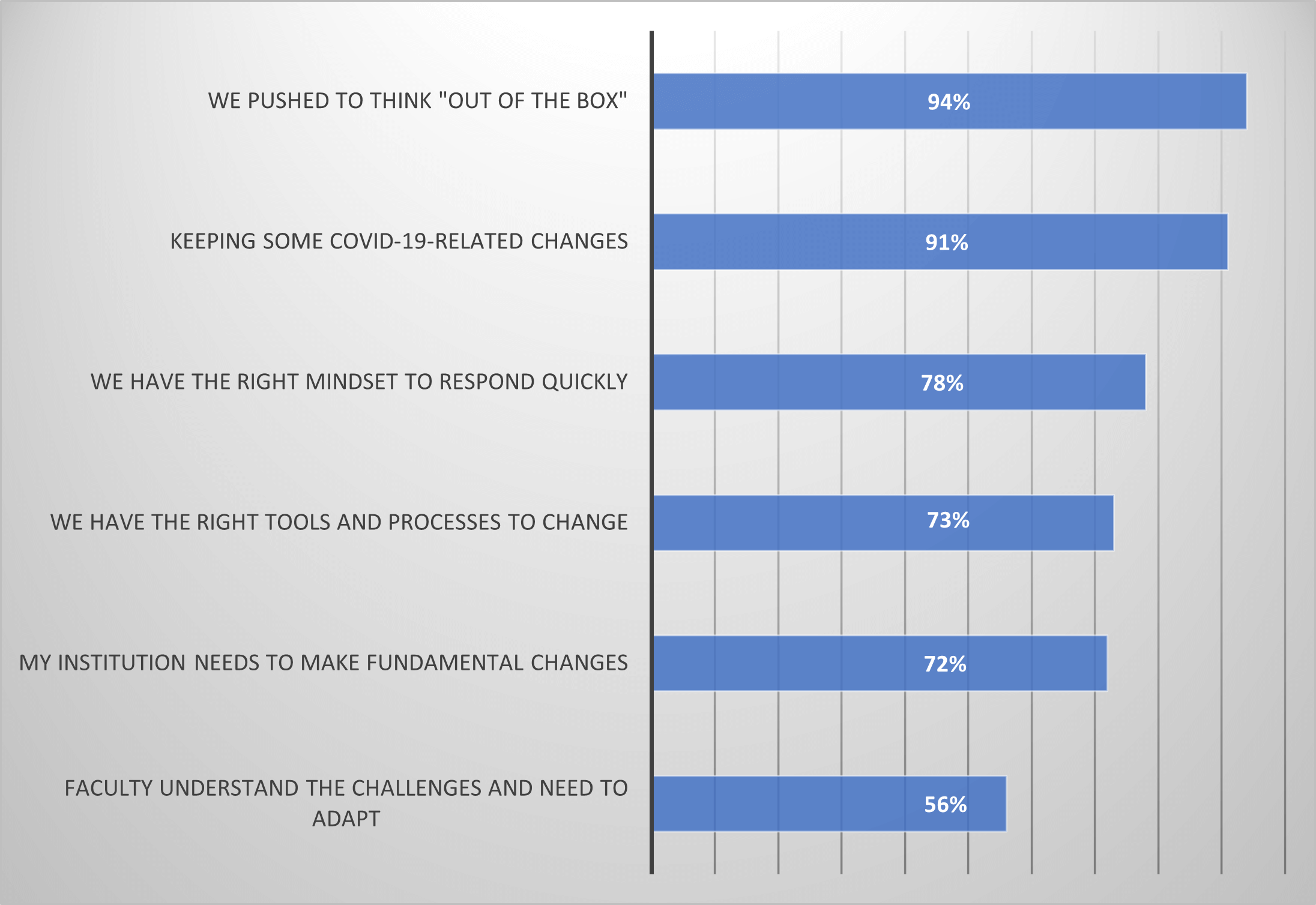Seventy-two percent of colleges in a 2022 nationwide survey said they still need to make fundamental changes after the pandemic. Just over 50 percent (56%) from that same survey said faculty need to understand the importance of adapting to our current economic environment. What does that say about college and university readiness for change?
Question: Schools have increased confidence in their financial stability despite the current headwinds (see FORsights™ article, “Confidence & Courage in Higher Education,” the first article in our Outlook in Focus series) … but what is their capacity for change?

Source: Inside Higher Ed1
Most experienced higher education leaders realize this indicates change is still needed in most schools. Experienced higher education leaders also recognize one barrier to change is the level of understanding of the current challenges. When some in the organization don’t fully understand the current challenges (like faculty), it is important to find ways to communicate clearly the source of challenges and the plans to deal with them. Faculty especially will expect that solutions that touch academic delivery will run through a shared governance process and give them the ability to weigh in regarding solutions.
The following five ideas for change in higher education institutions were drawn from two articles, “Change Management in Higher Education: Through the Lens of Executive Coaches”2 and “Change Management in Higher Education.”3
Idea 1
Increase recognition of three critical issues:
- The need for collaborative behavior rather than a silo-oriented view of problems and possible solutions.
- Work toward positive and constructive responses to ambiguities in data collected on academic programs when doing program margin analysis, academic program reviews, or administrative cost reviews. The process of collecting data in these areas is notoriously complex and can easily be misunderstood.
- Accept the fact that data collection takes time and understanding the results takes even longer. Be patient with yourself and your team.
Idea 2
Shift away from strategic planning and focus most of your energy on strategic doing. In doing this, keep meticulous track of evidence that strategies are being executed and once executed, the executed strategies have the intended results. Keeping a scorecard with dates accomplished and results helps. This kind of scorecard may be of great help to boards, especially if they are struggling to connect the dots between strategies in the plan and results achieved.
Idea 3
When doing academic program assessments, focus on four key actions:
- Support English and mathematics as core disciplines. They are usually central to most university missions.
- Support the programs that are well attended and generate margin. In a successful portfolio of academic programs, these are critical elements to overall success. When doing so, promote an attitude that seeks to make better use of existing resources rather than focusing on new resources needed to accomplish change.
- Identify and seize opportunities to grow new and relevant academic programs.
- Eliminate anything that does not add to mission accomplishment. Do this after you have gained positive momentum making other changes. It is the hardest part of the journey.
Idea 4
Build a shared vision of success and support it with good data. The ability to tell the story of a hopeful future is important to achieving your goals. Your strategic plan will provide the details of the shared vision. Having that strategic plan broken down into bite-sized pieces that are defined as specific initiatives with start and end dates and individuals assigned to the execution of those initiatives will supply the details of the data that should be tracked and reported on to help tell the story about your forward progress.
Idea 5
Frame the current environment with belief and encouragement that the institution can adapt and thrive rather than framing with a scarcity mindset. A scarcity mindset only looks at risks to avoid and the lack of resources as opposed to a viewpoint that understands risks but takes measured risks to help drive success and finds ways to succeed with the resources currently available.
The three most important skills for successful and encouraging change management are not related to technical matters. They are related to three personal skills of leadership:
- Responsibility: Make sure those linked most closely with the daily workings of key departments are important contributors to the decision-making team rather than the recipient of decisions made.
- Honesty: Transparency with data and its collection process is an important element that either builds trust in the honesty of the process or tears it apart. Make sure the meaning of terms and sources of data are available.
- Resiliency: Make sure the vision is clear and that evidence of progress is shared widely and frequently. When the vision and path to success is less than clear, frustration, insecurity, and lack of trust in leadership grows.
If your college or university has struggled to make the changes needed to maintain financial resiliency, the next article in our series will cover external reactions to your institution’s financial condition, primarily oriented to the external auditor’s view of your financial resilience. In the meantime, a look at Patrick Lencioni’s book, The Advantage,4 will support the ideas behind these suggestions.
If you have questions or need assistance, please reach out to a professional at FORVIS or use the Contact Us form below.
- 1“The 2022 Survey for College and University Presidents,” insidehighered.com, March 30, 2022
- 2“Organizational Change Management in Higher Education through the Lens of Executive Coaches,” mdpi.com, May 31, 2021
- 3“Change Management in Higher Education,” chronicle.com, viewed on October 3, 2022
- 4“The Advantage: Why Organizational Health Trumps Everything Else in Business,” Patrick Lencioni, San Francisco: Jossey Bass, 2012.

